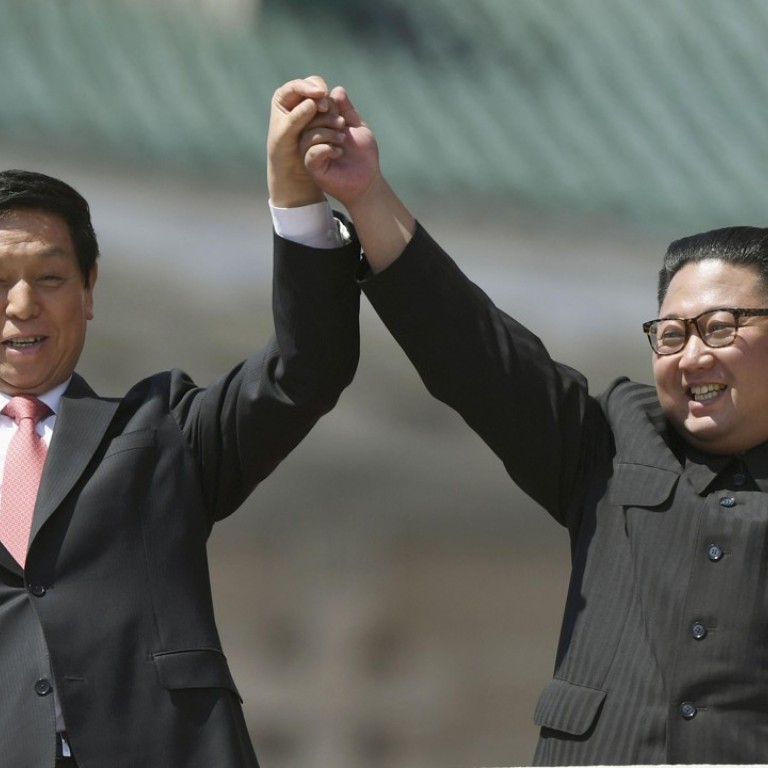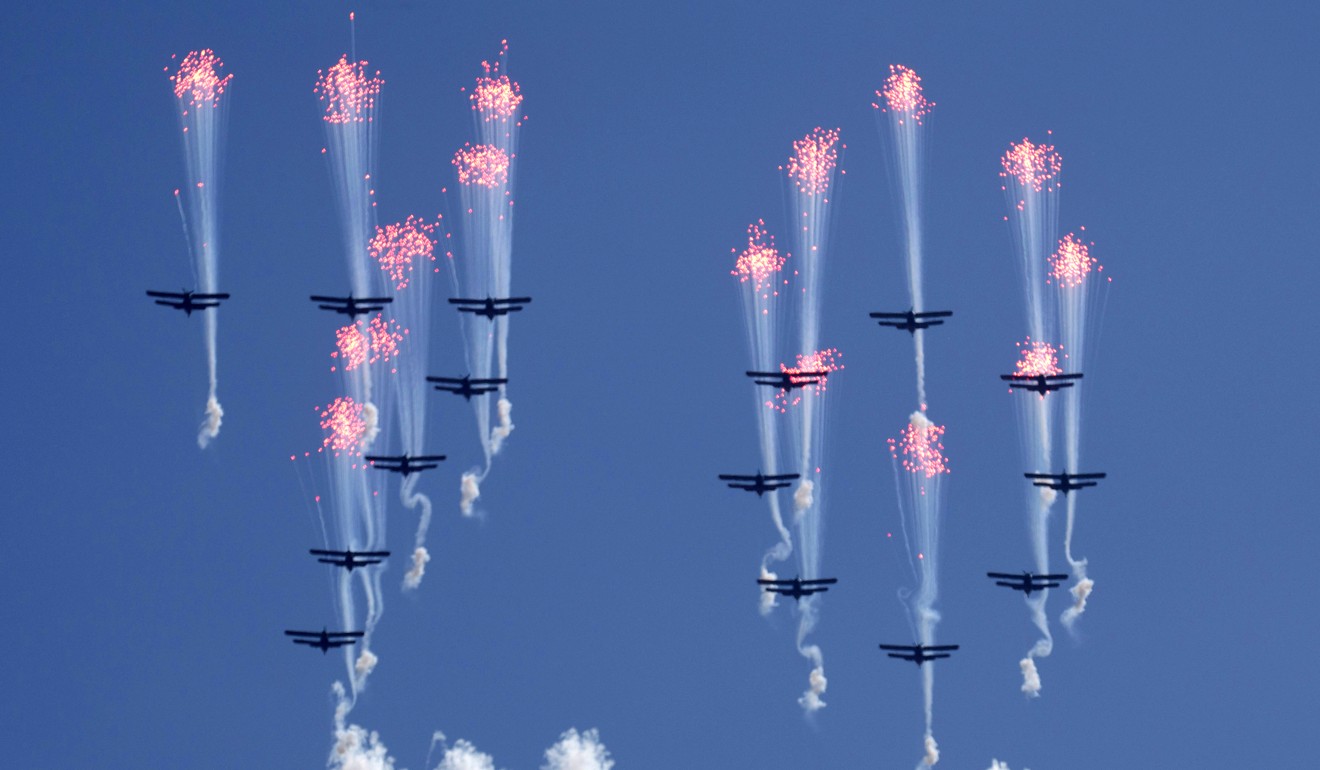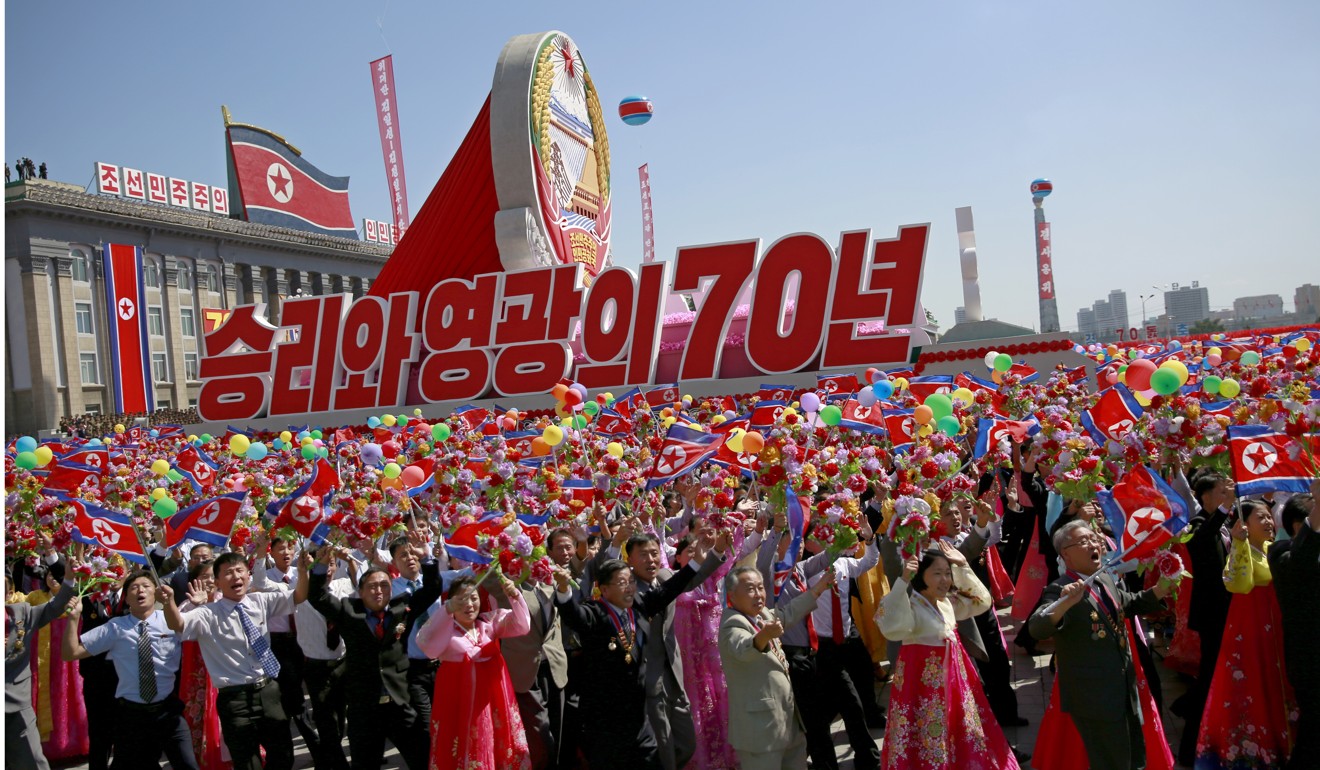
Chinese president’s right-hand man presses North Korea’s Kim Jong-un to realise Singapore nuclear consensus with Donald Trump
Pyongyang puts on show of military hardware for 70th anniversary parade but doesn’t roll out long-range missiles in ‘goodwill gesture’ to US
Chinese President Xi Jinping’s right-hand man has urged North Korean leader Kim Jong-un to realise the consensus on denuclearisation he reached with US President Donald Trump in Singapore in June.
Li Zhanshu, Beijing’s third-ranking Communist Party official, issued the call in talks with Kim on Sunday while in Pyongyang for celebrations to mark the 70th anniversary of North Korea.
Li stressed the need for North Korea and the US “to thoroughly implement the consensus ... to reach the common goal of denuclearisation”, state broadcaster China Central Television reported.
Kim said North Korea had already taken steps towards denuclearisation, and wanted “the US side to take reciprocal measures to solve the Korean peninsula issues diplomatically”.
“I [also] wish to learn from the Chinese experience of economic development,” Kim was quoted as saying.
China’s state-run Xinhua News Agency said Xi sent a message to Kim on behalf of the Chinese Communist Party to congratulate North Korea on its 70th anniversary ”, and to express Xi’s desire to work closely with Kim to promote a “long-term, healthy and stable development of China-North Korea relations”.
There’s no point asking why Xi Jinping isn’t going to North Korea. A better question is: what would he achieve by doing so?
The talks came after North Korea rolled out tanks and troops – but no long-range missiles – for an anniversary military parade, a move observers said could be a goodwill gesture to the US to foster talks on nuclear weapons.
Observers said the decision to hold off on the intercontinental ballistic missiles could also earn North Korean leader Kim Jong-un a visit by Chinese President Xi Jinping and even another summit with US President Donald Trump.
But they also warned that simply keeping the ICBMs out of sight would not deflect Washington’s scrutiny of Pyongyang’s nuclear programme.
Sunday’s military parade was North Korea’s first since Kim and Trump met in Singapore in June, and bigger than one in February to mark the 70th anniversary of the Korean People’s Army, according to a South Korean military source.
But the most powerful missiles on show were short-range battlefield devices.
Atsushi Tago, professor of international relations at Tokyo’s Waseda University, said the absence of the ICBMs could signal Kim’s willingness to “denuclearise” and raise prospects for talks with the United States.
“It would be logical to interpret that North Korea would still like to be in line with the Trump-Kim agreement in Singapore,” Tago said.
At their meeting on June 12, Trump and Kim agreed to work towards “complete denuclearisation” of the peninsula.
According to South Korean diplomatic sources, Trump also underscored the need for North Korea to shut down its ICBM facilities. Kim agreed to take action on the missiles but the agreement was not included in the two leaders’ joint declaration, the sources said.

Monitoring group 38 North said satellite images taken on August 3 suggested that North Korea had started dismantling ICBM facilities at Sohae, about 200km (120 miles) northwest of Pyongyang.
Song Zhongping, a former member of China’s rocket corps, said Sunday’s “low-profile” parade indicated that Kim did not want to sent any signals that might provoke Washington.
“There were no Hwasong-14s, Pukguksongs or other weapons of mass destruction that could threaten the US – just some conventional and defensive arms,” Song said.
“Pyongyang doesn’t want to irritate the US and the international community amid the new calm on the Korean peninsula.
“Kim also wants to create a ‘good atmosphere’ for his third meeting with [South Korean President] Moon Jae-in next week.”
Xi Jinping to send right-hand man Li Zhanshu to North Korea
Song said Kim might also be aiming for another summit with the US president.
“The North wants to show their ‘determination and sincerity’ for denuclearisation, as Kim desires continued negotiations with Trump,” he said.
Zhao Tong, a fellow in Carnegie’s Nuclear Policy Programme at the Carnegie-Tsinghua Centre for Global Policy in Beijing, said another goal might be economic.
In April, Kim said the country was shifting away from its byungjin twin-track policy of developing nuclear weapons and the economy at the same time, to focusing solely on the economy.

“North Korea has a strategic interest in building a positive relationship with the US to create a favourable environment for its economic development ... By refraining from showing off its most provocative missiles, North Korea seeks to maintain the momentum of improving bilateral relations with the US and of breaking its international isolation,” Zhao said.
“[This] also makes it easier for the widely speculated visit by the Chinese president to take place.
“Xi’s visit would be an important step forward.”
North Korea preparing military parade to showcase missiles as denuclearisation stalls
Zhang Baohui, professor of political science at Lingnan University in Hong Kong, said the lower-key parade worked in China’s favour.
“Trump has been saying that China is undermining his Korea policy by encouraging Kim not to denuclearise ... Beijing does want to de-escalate the rising mistrust between China and Trump over the North Korean issue. So the restrained parade should give Trump little excuse to further criticise China,” Zhang said.
But analysts were sceptical that the gesture would speed up thedenuclearisation process.
“The restraint by North Korea does not necessarily mean it will implement denuclearisation as promised ... Fundamentally, North Korea’s nuclear quest is driven by its profound insecurity and mistrust against the US,” Zhang said.
David Tsui, a Zhongshan-based war historian also known as Xu Zerong, said that “whatever Kim has done, the US would not trust him”.
“It’s impossible to change a communist dictatorship … If the US proves that the North has held on to some nuclear weapons, [the Americans] will definitely wipe him out,” Tsui said.


